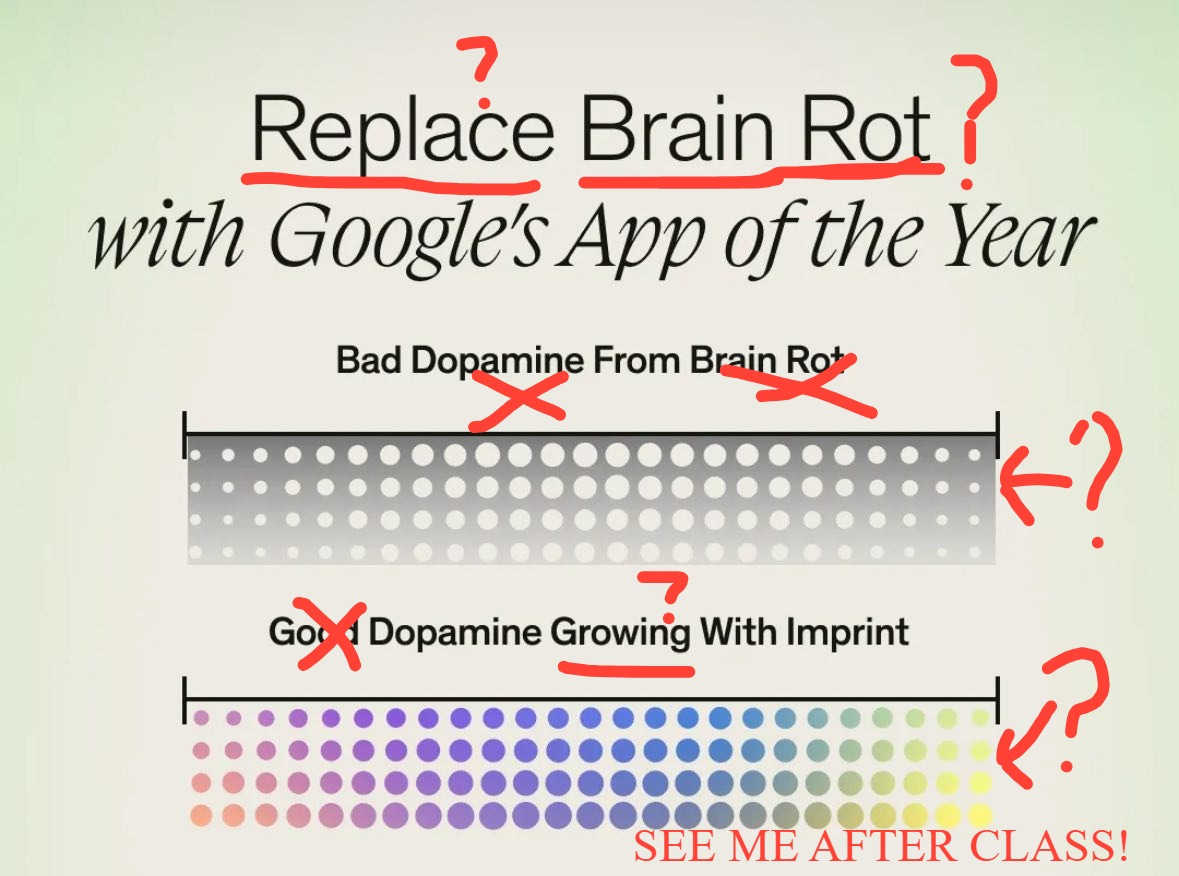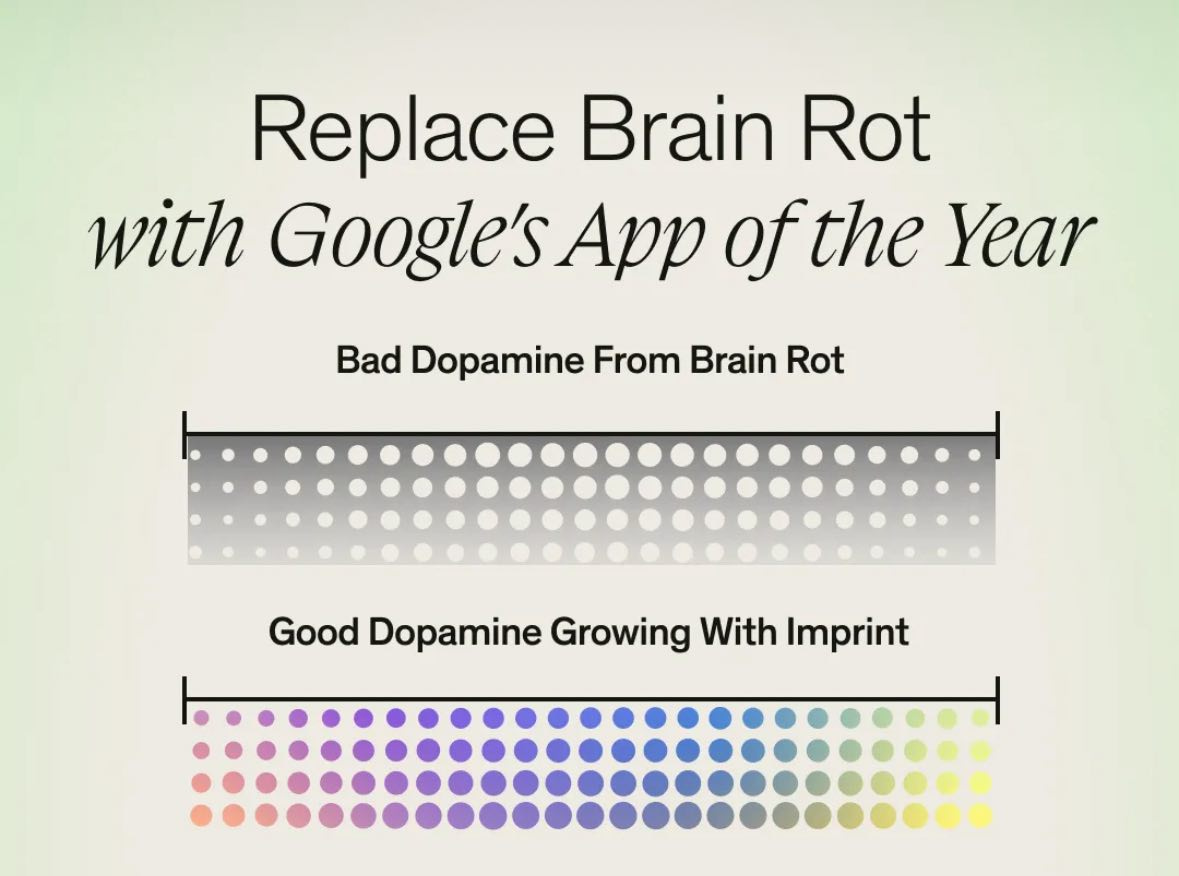What the hell is 'bad dopamine'? [Online ads are literally making up 'science' now]
There are rules and regulations, however inadequate or poorly enforced, about making scientific claims in adverts. Unless it's online. Then you can just make sh*t up

Apologies to regular readers for the lack of posts last week. I was away with my family and didn’t get chance to prepare scheduled articles beforehand. Although, rest assured, if/when I set up the subscription option for this blog (and assuming anyone actually signs up), I will make sure my output remains uninterrupted.
And there’s a nice, if indirect, segue into the issue this post is about; using science to get money from people. More specifically, making science-based promises about something in order to convince people to buy it1.
As someone who first cut his teeth in science writing and commentary during the era of Gillian McKeith, and her fall from ‘scientific’ grace thanks to the efforts of Ben Goldacre and followers, and Simon Singh’s battle with the British Chiropractic Association, scientifically-dubious claims in the name of advertising and profit is an issue I’ve long kept an eye on.
I confess I’ve been working on this issue behind the scenes for a while now, and while most of the things I’ve got in the pipeline aren’t complete, I couldn’t just ignore this one.
Basically, when I was meant to be on holiday, my oft-referenced friend, intellectual neuro-superior and former Guardian blog comrade Prof. Pete Etchells, sent me a message. A message which contained an online ad that he had just been presented with.
This ad.
Now, I recently wrote a guest piece all about the modern obsession with invoking/misusing/warping dopamine and its functions, for
’s blog. While well received, a few people took issue with what they considered to be me policing language, or getting angry about people using simple shorthand to convey complex issues. For the record, I have no issue with any of those things in principle.But that’s not what’s happening. In most cases. It’s more that people are regularly, whether knowingly or unknowingly, using terms and concepts in ways that are clearly, objectively wrong. And last I checked, ‘misinformation’ was a bad thing? Call me naïve, but I still think that’s the case.
And this ad, this is the worst example I’ve seen yet. So, look at all the ways in which it is wrong.
“Replace Brain Rot”

This probably deserves a whole post of it’s own, so I won’t go into it so much here, but suffice to say that ‘brain rot’ is far more of a cultural concept than a scientific one. Sure, people may well get too absorbed in their phones and all the simple, quick, and frivolous content they can be bombarded by at any given moment. And this may be detrimental to their overall cognitive abilities.
But then, people said the same about TV. And reading. And the act of writing2.
Although, maybe these things did/do impact on how our brains function? Can’t rule it out. But my contention is, there’s a big difference between “brain doesn’t do a particular thing well” and “brain cannot and never will do a particular thing well”.
To put it more simply, even if someone does get sucked into TikToks at every waking moment to the point where they struggle to focus or lack attention span, this isn’t indicative of some fundamental biological problem. We know the brain is incredibly adaptable, so it can certainly unlearn these bad habits and tendencies.
The problem is, the term ‘brain rot’ clearly suggests otherwise. ‘Rot’ is not a temporary, fleeting problem. It’s permanent, and irreversible. Bluntly suggesting that it’s happened to your brain is a very significant claim indeed. One that cannot be backed up by science.
So how do you replace brain rot, as the ad suggests? Why would you even want to? Wouldn’t it be much better to get rid of brain rot in its entirety? I mean, a surgeon wouldn’t offer to replace a tumour? An exterminator wouldn’t suggest replacing your mouse infestation, with rats, or scorpions. So what is being offered here?
You might think I’m being needlessly pedantic. Because it obviously means “replace things that cause brain rot with something that doesn’t cause brain rot”.
Normally, I’d agree this is the most likely explanation. Even though I take issue with the fact that it’s left to the reader to interpret it ‘directly’. That’s not usually how ads work, and ads that say “you need to interpret our claims correctly” will always strike me as a bit dubious.
However, the argument that “you shouldn’t take this claim so literally” would be easier to defend, if it weren’t for the following claims.
“Bad Dopamine From Brain Rot”
As the title of this article already asked… what the hell is ‘bad’ dopamine?
Seriously. Dopamine is an important and versatile neurotransmitter with multiple functions and roles in your typical brain. It has a relatively simple molecular structure. What your brain uses it to do depends on your experiences and how it adapts in accordance to them. Like any other neurotransmitter, within reason.
But the idea that dopamine can be ‘bad’? That’s not a thing! This ad implies that the dopamine in your brain is like a selection box of chocolates, and after too long on social media or whatever, your brain has gone through all the dopamine salted caramels and miniature eclairs, and your left with dopamine raisin centres and dopamine coconut.
And even that’s being generous. The invoking of brain rot suggests that he dopamine you’re left with is toxic and unpleasant in some way. Like agricultural runoff. Or that vile liquid that gathers in the salad drawer of your fridge when you’ve unknowingly left a lettuce in there for 11 months. It’s still vegetable matter, but it’s bad vegetable matter.
However, this can’t be stressed enough; this cannot happen with dopamine. It is what it is. Whatever your brain does with it, it’s the same dopamine molecule doing it. There is no good or bad version. Even if you represent it as a sequence of basic circles on a grey background.
Which is another thing: the image presented in this ad doesn’t have a single thing to do with dopamine. It’s a basic molecule. Representing it as a white circles on a grey background doesn’t mean anything! Are we expected to believe the marketers lined up an array of molecules for a moody photo shoot? Because I can assure you they didn’t.
And if you still think I’m being needlessly pedantic…
“Good Dopamine Growing” (With Imprint)
Apparently if you use this app (imprint), you can grow good dopamine.
Again, this has no basis in anything known to science.
Your brain is always ‘growing’ (i.e. manufacturing, synthesising) dopamine in the relevant neurons. Just like it’s doing when you are engaging in unhealthy brain-rot-ty habits.
It’s also not clear how an app, something external that you just look at, could be responsible for growing a neurotransmitter. They’re not daffodils. Maybe they mean growing more neurons that use dopamine? But even then, it’s far fetched. Neurogenesis, the creation of new neurons, can happen in a mature human brain, but only in specific, specialised areas. It’s not really a ‘dopamine’ thing. And even if it were, it’d be happening anyway!
And even if this ‘good’ dopamine did exist, it certainly wouldn’t be in a range of bright primary colours. Dopamine is a molecule. A relatively simple, small one. It’s not big enough to absorb and re-emit light which has a greater wavelength than its span, so it has no colour.
Maybe this ad is referencing massive recent breakthroughs that I (someone who’s subscribed to all the neuroscience mailing lists I know of and is regularly contacted by mainstream media people whenever anything even vaguely brain related tentatively makes the news) have somehow not been made aware of. But I don’t think that’s likely. Occam’s razor, etc.
“Google’s app of the year”
There is one thing about the ad that’s right. It seems that Imprint was indeed Google’s app of the year, 2023.
Which is fine. It appears to be an app dedicated to teaching users about complex matters via simpler language and imagery. And honestly? I’ve no beef with that. I strive for that myself on a regular basis.
And it does seem to genuinely be this award winning app. Again, that’s fine. It does seem like a lot of work and expertise as one into it.
But… this makes the ad even worse.
For one, the whole point of this app seems to be teaching people complex issues in manageable, digestible ways. You’d think that actively spouting utter BS to your potential subscribers would undermine that somewhat?
But on top of that, this app seemingly is a Google app of the year. Or a year, at least. Google is one of the biggest and most powerful corporations on Earth. And they’re being cited, accurately, as approving of an app that is, in its advertising, making wild, potentially-harmful claims about dopamine and the brain. Your average person could easily think “If Google approves, it must be true”. Because why wouldn’t they think that? Google is likely where they get most of their information.
But this is a dangerous game to play. Filling people full of, inaccurate at best, actively deceptive at worst, information about the brain and its workings won’t help anyone.
That major corporations and supposedly-educational apps are actively spreading this information will help people even less. Probably the opposite.
To summarise, in my guest post for
, I introduced the term ‘science garnish’, to describe how countless people will just drop scientific terms and jargon (like ‘dopamine’) into their rhetoric to seem more credible. But this add goes beyond garnish. This is is serving someone a plate of wood chips and gravel and telling them it’s a gourmet meal, and expecting them to still pay for it.And a lot of people still would! That’s the most maddening thing.
Why Your Parents Are Hung-Up on Your Phone and What To Do About It is my latest book. You should buy it, so I don’t have to sell my soul to Google. For a few months.
There are no doubt many other ways to use science to get money from people. E.g. “I have spent years researching the deadliest poison known to humankind, give me a billion dollars or I’ll dump it in a reservoir”. Granted, that’s probably a bit more of a ‘supervillain’ approach than most would have the time and inclination to pursue.
Socrates was concerned about this. The Socrates, credited by many as the originator of modern thought.








Preach! Honestly, I may cause an act of harm one day as a result of science garnish. I do understand the whole 'don't police language' thing, but at the same time, if we don't police it a little, it just becomes meaningless word salad. I feel violent every time anyone mentions dopamine hits and pops of dopamine. I also feel sad on behalf of acetylcholine. It feels very transmitterist to constantly chat on about dopamine.
I see Instagram posts all the time that tell women they are "addicted to dopamine", or that they need a "dopamine detox". It sounds very accusatory. And ads for apps tell us
that our vagus nerve is 'imbalanced' and needs 'rebalancing'. Does it? How does one go about rebalancing a nerve? Can anyone tell me?